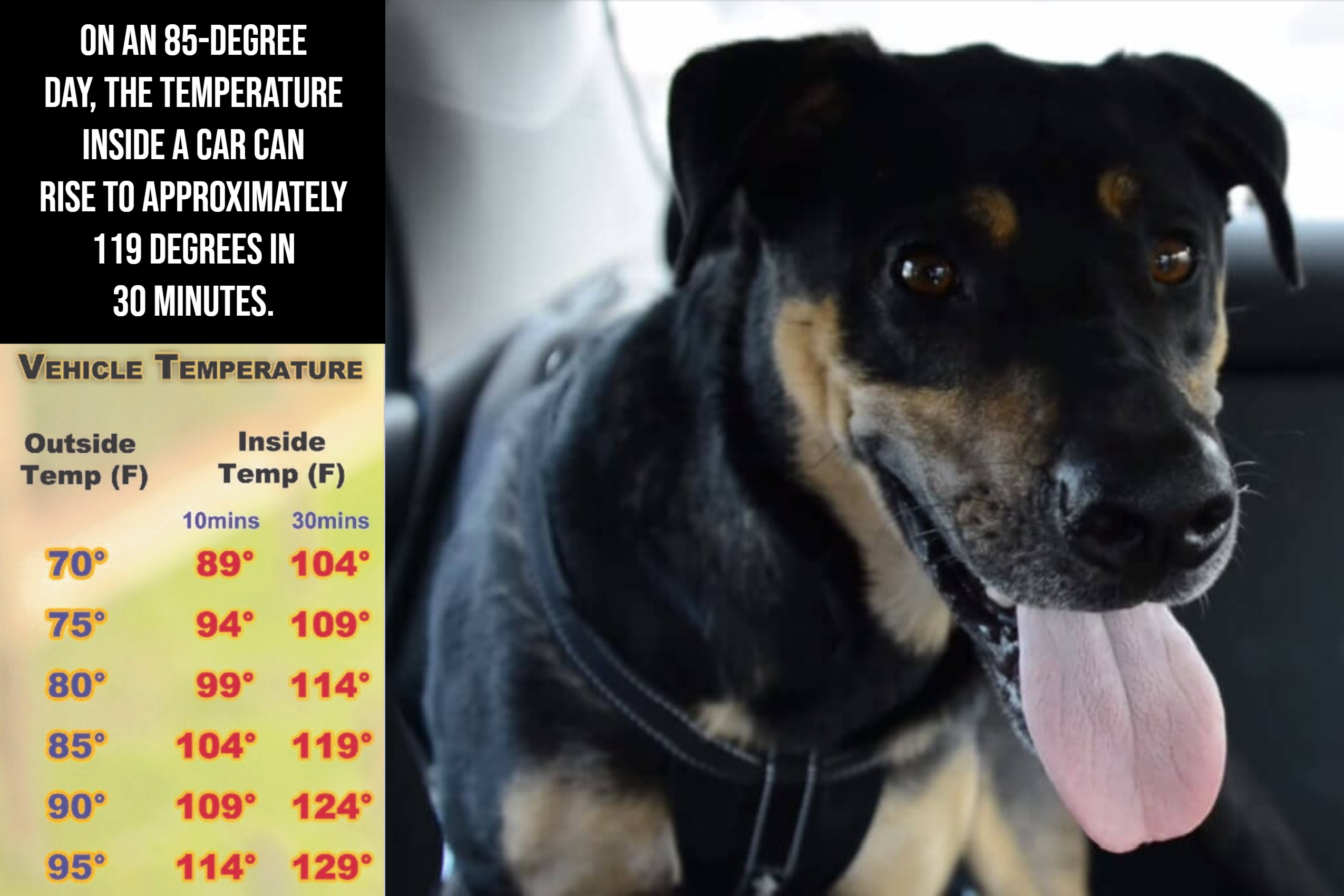Wilmington Man Charged with Animal Cruelty After Dog Dies in Hot Car
Delaware Health and Social Services | Division of Public Health | Newsroom | Date Posted: Thursday, June 27, 2019
Delaware Health and Social Services | Division of Public Health | Newsroom | Date Posted: Thursday, June 27, 2019

WILMINGTON – Officers from the Delaware Division of Public Health (DPH) Office of Animal Welfare (OAW) arrested a Wilmington man following an incident involving the death of a dog left in a hot vehicle. Officers arrested the dog’s owner, 41-year-old Lamonte Jordan on Tuesday, June 25, 2019. Jordan was charged with two counts of cruelty to animals, two counts of failure to vaccinate for rabies and two counts of failure to obtain a dog license. He was released on $4,500 unsecured bail.
The OAW Delaware Animal Services (DAS) unit, which enforces statewide animal control and cruelty laws, responded to a report of two dogs left in a hot vehicle Tuesday. Upon arrival, the officers found one dog muzzled and tethered inside of a makeshift crate in the vehicle, and a second dog that was deceased. The officers’ investigation revealed that the animals had been in the car for an extended period of time. Officers seized the surviving dog, which is being held pending the outcome of the cruelty investigation.
OAW reminds dog owners that it is illegal and unsafe to leave dogs in a car on a hot day. The temperatures inside a car can quickly rise, putting the dog at risk of heatstroke and death.
“This situation is entirely preventable,” said OAW Director Christina Motoyoshi. “Despite efforts to educate the public about the dangers of hot temperatures in regards to our pets, individuals still leave their dogs in hot cars. Dogs should not be left in any vehicle for any amount of time in the summer. OAW will have no tolerance for this offense, and law enforcement action will be taken.”
Individuals who observe a dog left in a car and cannot locate the owner should call Delaware Animal Services at 302-255-4646 or call 9-1-1 immediately. It is illegal for anyone besides first responders to break a vehicle’s windows to free an animal.
According to the American Veterinary Medical Association (AVMA), the interior of a vehicle can reach 89 degrees in just 10 minutes when the temperature outside is just 70 degrees. On an 85-degree day, the temperature inside a car can rise to approximately 119 degrees in 30 minutes. Temperatures will continue to rise inside a vehicle, and the AVMA states that cracking windows does little to help.
Animals at the greatest risk of stress from the heat include pregnant or lactating animals, very young and older animals, animals with darker coats, obese pets, short-nosed dog breeds, and animals with chronic health conditions. Signs of heat stress can include panting, increased salivation, restlessness, muscle spasms, increased heartbeat and body temperature, weakness, lack of coordination, bright red or pale and sticky gums, vomiting, diarrhea and depression.
Pet owners should take these additional steps to protect their animals during excessive heat in the summer months:
• Animals should have access to shade and water when outside: The best place for pets in hot temperatures is inside the home. If a pet must be outside in the heat, make sure the animal has a shady area and fresh water to help stay cool. The interiors of cat and dog houses can get very hot in summer months and, therefore, do not provide adequate shade.
• Practice caution when walking dogs in the heat: The best time of day to walk dogs in summer months is in the early morning or late evening when the sun’s heat is not as intense. A simple touch of the hand to any surface where a walk is planned will tell if it’s too hot for a dog. If it’s too hot for a human hand, it’s too hot for a dog’s paws.
• Pay attention to signs of heat stroke: Just like humans, dogs are susceptible to heat stroke in high temperatures, especially if there is increased activity or little ventilation. A dog that is drooling and panting due to heat can quickly progress to a heat stroke, which can be life-threatening. Immediate veterinary attention is suggested for dogs that have become over-heated.
For more information, visit https://animalservices.delaware.gov/ or https://www.avma.org/public/PetCare/Pages/Hot-Cars-and-Loose-Pets.aspx.
A person who is deaf, hard-of-hearing, deaf-blind or speech-disabled can call the DPH phone number above by using TTY services. Dial 7-1-1 or 800-232-5460 to type your conversation to a relay operator, who reads your conversation to a hearing person at DPH. The relay operator types the hearing person’s spoken words back to the TTY user. To learn more about TTY availability in Delaware, visit http://delawarerelay.com.
The Delaware Department of Health and Social Services is committed to improving the quality of the lives of Delaware’s citizens by promoting health and well-being, fostering self-sufficiency, and protecting vulnerable populations. DPH, a division of DHSS, urges Delawareans to make healthier choices with the 5-2-1 Almost None campaign: eat 5 or more fruits and vegetables each day, have no more than 2 hours of recreational screen time each day (includes TV, computer, gaming), get 1 or more hours of physical activity each day, and drink almost no sugary beverages.
Keep up to date by receiving a daily digest email, around noon, of current news release posts from state agencies on news.delaware.gov.
Here you can subscribe to future news updates.
Delaware Health and Social Services | Division of Public Health | Newsroom | Date Posted: Thursday, June 27, 2019

WILMINGTON – Officers from the Delaware Division of Public Health (DPH) Office of Animal Welfare (OAW) arrested a Wilmington man following an incident involving the death of a dog left in a hot vehicle. Officers arrested the dog’s owner, 41-year-old Lamonte Jordan on Tuesday, June 25, 2019. Jordan was charged with two counts of cruelty to animals, two counts of failure to vaccinate for rabies and two counts of failure to obtain a dog license. He was released on $4,500 unsecured bail.
The OAW Delaware Animal Services (DAS) unit, which enforces statewide animal control and cruelty laws, responded to a report of two dogs left in a hot vehicle Tuesday. Upon arrival, the officers found one dog muzzled and tethered inside of a makeshift crate in the vehicle, and a second dog that was deceased. The officers’ investigation revealed that the animals had been in the car for an extended period of time. Officers seized the surviving dog, which is being held pending the outcome of the cruelty investigation.
OAW reminds dog owners that it is illegal and unsafe to leave dogs in a car on a hot day. The temperatures inside a car can quickly rise, putting the dog at risk of heatstroke and death.
“This situation is entirely preventable,” said OAW Director Christina Motoyoshi. “Despite efforts to educate the public about the dangers of hot temperatures in regards to our pets, individuals still leave their dogs in hot cars. Dogs should not be left in any vehicle for any amount of time in the summer. OAW will have no tolerance for this offense, and law enforcement action will be taken.”
Individuals who observe a dog left in a car and cannot locate the owner should call Delaware Animal Services at 302-255-4646 or call 9-1-1 immediately. It is illegal for anyone besides first responders to break a vehicle’s windows to free an animal.
According to the American Veterinary Medical Association (AVMA), the interior of a vehicle can reach 89 degrees in just 10 minutes when the temperature outside is just 70 degrees. On an 85-degree day, the temperature inside a car can rise to approximately 119 degrees in 30 minutes. Temperatures will continue to rise inside a vehicle, and the AVMA states that cracking windows does little to help.
Animals at the greatest risk of stress from the heat include pregnant or lactating animals, very young and older animals, animals with darker coats, obese pets, short-nosed dog breeds, and animals with chronic health conditions. Signs of heat stress can include panting, increased salivation, restlessness, muscle spasms, increased heartbeat and body temperature, weakness, lack of coordination, bright red or pale and sticky gums, vomiting, diarrhea and depression.
Pet owners should take these additional steps to protect their animals during excessive heat in the summer months:
• Animals should have access to shade and water when outside: The best place for pets in hot temperatures is inside the home. If a pet must be outside in the heat, make sure the animal has a shady area and fresh water to help stay cool. The interiors of cat and dog houses can get very hot in summer months and, therefore, do not provide adequate shade.
• Practice caution when walking dogs in the heat: The best time of day to walk dogs in summer months is in the early morning or late evening when the sun’s heat is not as intense. A simple touch of the hand to any surface where a walk is planned will tell if it’s too hot for a dog. If it’s too hot for a human hand, it’s too hot for a dog’s paws.
• Pay attention to signs of heat stroke: Just like humans, dogs are susceptible to heat stroke in high temperatures, especially if there is increased activity or little ventilation. A dog that is drooling and panting due to heat can quickly progress to a heat stroke, which can be life-threatening. Immediate veterinary attention is suggested for dogs that have become over-heated.
For more information, visit https://animalservices.delaware.gov/ or https://www.avma.org/public/PetCare/Pages/Hot-Cars-and-Loose-Pets.aspx.
A person who is deaf, hard-of-hearing, deaf-blind or speech-disabled can call the DPH phone number above by using TTY services. Dial 7-1-1 or 800-232-5460 to type your conversation to a relay operator, who reads your conversation to a hearing person at DPH. The relay operator types the hearing person’s spoken words back to the TTY user. To learn more about TTY availability in Delaware, visit http://delawarerelay.com.
The Delaware Department of Health and Social Services is committed to improving the quality of the lives of Delaware’s citizens by promoting health and well-being, fostering self-sufficiency, and protecting vulnerable populations. DPH, a division of DHSS, urges Delawareans to make healthier choices with the 5-2-1 Almost None campaign: eat 5 or more fruits and vegetables each day, have no more than 2 hours of recreational screen time each day (includes TV, computer, gaming), get 1 or more hours of physical activity each day, and drink almost no sugary beverages.
Keep up to date by receiving a daily digest email, around noon, of current news release posts from state agencies on news.delaware.gov.
Here you can subscribe to future news updates.